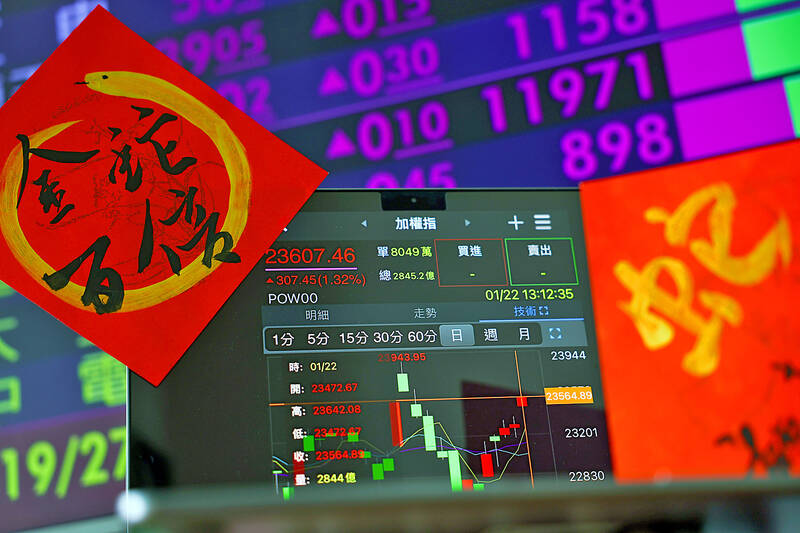The TAIEX ended the Year of the Dragon yesterday up about 30 percent, led by contract chipmaker Taiwan Semiconductor Manufacturing Co (TSMC, 台積電).
The benchmark index closed up 225.40 points, or 0.97 percent, at 23,525.41 on the last trading session of the Year of the Dragon before the Lunar New Year holiday ushers in the Year of the Snake.
During the Year of the Dragon, the TAIEX rose 5,429.34 points, the highest ever, while the 30 percent increase in the year was the second-highest behind only a 30.84 percent gain in the Year of the Rat from Jan. 25, 2020, to Feb. 11, 2021, Taiwan Stock Exchange data showed.

Photo: CNA
Trading in Taiwan is set to resume on Feb. 3, the sixth day of the first month of the Year of the Snake, the exchange said.
During the Year of the Dragon, the exchange’s market capitalization rose by more than NT$18 trillion (US$549 billion) to NT$75.53 trillion, an average of about NT$1.36 million for each of the 13.21 million investors in the market as of the end of last year.
TSMC, which closed at NT$646 at the end of the Year of Rabbit, soared 75.6 percent to NT$1,135 in the Year of the Dragon, and its market capitalization rose by NT$12.68 trillion, accounting for about 70 percent of the exchange’s total market capitalization growth.
Led by TSMC, the TAIEX breached the 20,000-point mark for the first time on March 8 last year, and hit a historical intraday high of 24,416.67 on July 11.
Schroder Investment Management (Taiwan) Ltd (施羅德證券投信) fund manager Bevan Yeh (葉獻文) said that while the TAIEX’s valuation had risen substantially, it still remained fair value.
TSMC’s American depositary receipts are trading at a growing premium over the stock in Taiwan, Yeh said, reflecting the confidence foreign institutional investors have in Taiwan’s semiconductor industry.
Foreign fund inflows are also expected to continue supporting the TAIEX and help it set new records, he said.
Taishin Securities Investment Advisory Co (台新投顧) analyst Tony Huang (黃文清) said that during the holiday, investors should monitor whether US President Donald Trump imposes new tariffs on China and the earnings reports of US companies, especially technology giants.

Nvidia Corp’s demand for advanced packaging from Taiwan Semiconductor Manufacturing Co (TSMC, 台積電) remains strong though the kind of technology it needs is changing, Nvidia CEO Jensen Huang (黃仁勳) said yesterday, after he was asked whether the company was cutting orders. Nvidia’s most advanced artificial intelligence (AI) chip, Blackwell, consists of multiple chips glued together using a complex chip-on-wafer-on-substrate (CoWoS) advanced packaging technology offered by TSMC, Nvidia’s main contract chipmaker. “As we move into Blackwell, we will use largely CoWoS-L. Of course, we’re still manufacturing Hopper, and Hopper will use CowoS-S. We will also transition the CoWoS-S capacity to CoWos-L,” Huang said

Nvidia Corp CEO Jensen Huang (黃仁勳) is expected to miss the inauguration of US president-elect Donald Trump on Monday, bucking a trend among high-profile US technology leaders. Huang is visiting East Asia this week, as he typically does around the time of the Lunar New Year, a person familiar with the situation said. He has never previously attended a US presidential inauguration, said the person, who asked not to be identified, because the plans have not been announced. That makes Nvidia an exception among the most valuable technology companies, most of which are sending cofounders or CEOs to the event. That includes

TARIFF TRADE-OFF: Machinery exports to China dropped after Beijing ended its tariff reductions in June, while potential new tariffs fueled ‘front-loaded’ orders to the US The nation’s machinery exports to the US amounted to US$7.19 billion last year, surpassing the US$6.86 billion to China to become the largest export destination for the local machinery industry, the Taiwan Association of Machinery Industry (TAMI, 台灣機械公會) said in a report on Jan. 10. It came as some manufacturers brought forward or “front-loaded” US-bound shipments as required by customers ahead of potential tariffs imposed by the new US administration, the association said. During his campaign, US president-elect Donald Trump threatened tariffs of as high as 60 percent on Chinese goods and 10 percent to 20 percent on imports from other countries.

INDUSTRY LEADER: TSMC aims to continue outperforming the industry’s growth and makes 2025 another strong growth year, chairman and CEO C.C. Wei says Taiwan Semiconductor Manufacturing Co (TSMC, 台積電), a major chip supplier to Nvidia Corp and Apple Inc, yesterday said it aims to grow revenue by about 25 percent this year, driven by robust demand for artificial intelligence (AI) chips. That means TSMC would continue to outpace the foundry industry’s 10 percent annual growth this year based on the chipmaker’s estimate. The chipmaker expects revenue from AI-related chips to double this year, extending a three-fold increase last year. The growth would quicken over the next five years at a compound annual growth rate of 45 percent, fueled by strong demand for the high-performance computing